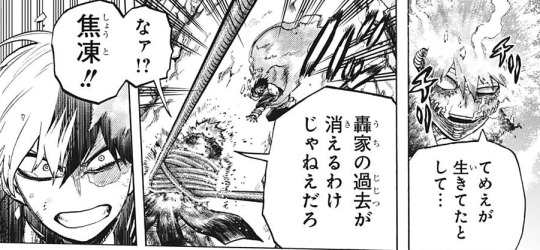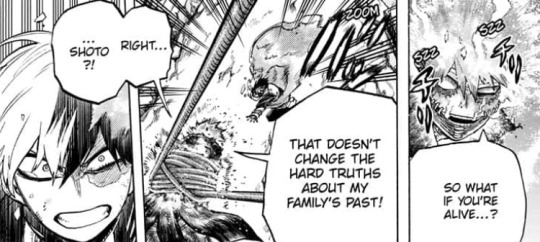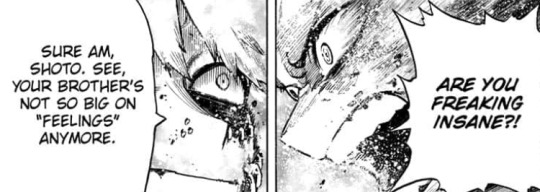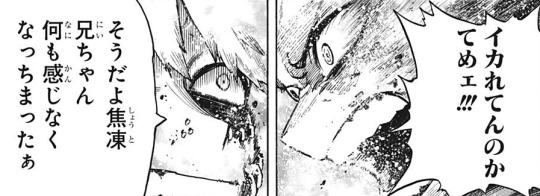#also this took a while pls show this some love sgnskgns
Explore tagged Tumblr posts
Text
Japanese vs. English Dabi - A 292 Comparison
As other people have already pointed it, the official translation is sometimes a little biased to the point of adding things into the text that aren’t in the original Japanese version or changing phrases to the point where the villains come off colder than they actually are.
The current chapters are highly important to Dabi’s and Shouto’s characters and so the official translation, unfortunately, can lead to people getting the wrong image of Dabi. This is not to say that Dabi is actually a super friendly guy - however, I don’t think you can get a full picture of all the layers to his character without taking the original text in mind.
Since there are a few panels I’m going to talk about from this chapter - comparing the Japanese version with the official translation and also dissecting and explaining the original Japanese phrases - I’m going to put the rest of this post under the cut because it’s a bit lengthy otherwise.

Let’s start with these panels. Though these aren’t mistranslated per se, just like with the “dance with your son in hell” line from the previous chapter, the furigana next to the kanji have a different meaning here. As discussed before, whenever this is the case, the furigana are what the character says, and the kanji represent what the character actually means.
The line in the second panel is: 「轟家の過去が消えるわけじゃねえだ���。」
轟家 「とどろきいえ ; todoroki ie 」-> the Todoroki household
の 「 no 」-> particle to indicate possession, works like an apostrophe
過去 「かこ ; kako 」 -> the past; a past (i.e. a personal history one would prefer remained secret); one’s past
が 「 ga 」 -> particle to mark the subject of the sentence
消える 「きえる ; kieru 」 -> to vanish; to disappear
わけじゃねえ 「 wakejanee 」 -> It doesn’t mean that
だろ 「 daro 」 -> right ? (used to ask the person you’re talking to for confirmation)
The two words that have a different furigana reading than they should have, are Todoroki household and past. According to the furigana, Dabi says:
「 うち 」-> house; one’s own home
「 じじつ 」-> truth; reality
So going by the kanji reading you get:
“This doesn’t mean that the past of the Todoroki household just disappears, right?”
Whereas what he actually says is:
“This doesn’t mean the truth of our home just disappears, right?”
In comparison to the “dance with your son in hell” line, these two versions don’t differ as much from another. Caleb actually addresses this in his twitter threat and sort of mixed the two versions into one: “This doesn’t change the hard truths about my family’s past!”

Personally, considering he is directly talking to Shouto here, I find the choice of translating the Todoroki household/home part into “my family” a bit weird. Since he seeks Shouto’s confirmation here, it would make more sense to translate it as “our family” in my opinion. The “my” makes it feel a lot more self-centered, even though there is no indication for him to only be referring to himself here.
Switching the word to vanish with “change” also slightly changes the meaning here. Though both are accurate, I feel like their past disappearing holds more weight. The line is, after all, referring to the fact that Best Jeanist has appeared, despite Dabi earlier announcing that the hero had been killed. So even though Dabi was wrong about that part, it doesn’t make his other facts go away. It’s not just about changing his words, but making it like they were never spoken in the first place. It’s a small difference, but a difference nonetheless.
Finally, the “hard truths” part instead of reality/past. It’s interesting to think about why Dabi says “truth” when he means “past”. But I think one way to look at it is that to Dabi, he has accepted the past. He has lived with it and carried it with him in silence for so long, but was always aware of it. Despite him not having told anyone else about it, he didn’t deny that past to himself. He shows his scars and he fights back. That is who Dabi is as the person that rose from Touya’s ashes. Meanwhile, he says “truth” while talking to Shouto. While we, the readers, and those around Shouto know of his hatred towards Endeavor, Dabi doesn’t know about this. To him, Shouto really is just Endeavor’s little doll. And so in Dabi’s eyes, Shouto has yet to see the truth. To acknowledge their past and the pain they all went through. And though Dabi might not be completely right about Shouto, he isn’t entirely wrong, either. Because even when Shouto hates Endeavor, even when he says he is just going to use him for his own gain, at the end of the day, regardless of his reasons, his actions are still what Endeavor wants him to do - to train hard and want to become the Number One Hero.
I included one the alternative meanings “a personal past one might prefer remained secret” because it also fits well with that interpretation. That the true meaning behind him saying “truth” is not just the mere past, but the part of the past they don’t want to share. Whether that’s because it’s an ugly one that could haunt them for the rest of their lives, or because it’s just difficult to talk about. Either way, it’s more than just memories from when their family was still young. In that, I think “hard truth” is actually a fitting translation, even when it doesn’t have the exact same nuance as the Japanese version.
While Shouto and Dabi are in many ways similar to another, they have slightly different goals: While Dabi wants to kill Endeavor, Shouto wants to save his mom. To both of them that is liberty, just with a different approach.
And the ending of the sentence, where he seeks confirmation from Shouto, sort of indicates just that. He wants Shouto to admit it. Pushing him into a corner and asking a question that only has one right answer. This is also similar to a few chapters ago when Toga confronted Uraraka with the question “Was Jin not a person?” It’s asking something with an obvious answer, yet the people being asked seem to not yet be able to give the right answer, even when they might already know it.

Next of, Shouto confronts Dabi about the villain he sent to their house, who could have killed Natsuo. As you can see in the panel above, the English translation has Dabi say: “Almost killed? What a shame. That would’ve really hurt Endeavor.”

Meanwhile, the Japanese version says: 「それならそれで。エンデヴァーが苦しむ。」
「それならそれで ; sorenara sorede 」 -> even so (expression frustration); still
「 エンデヴァー ; Endebā 」 -> Endeavor
「 が ; ga 」 -> particle to mark the subject of the sentence
「 苦しむ ; kurushimu 」 -> to suffer
As you can see, “Almost killed? What a shame” is kind of very far off from the actual meaning. While the official translation makes it almost sound like Dabi is disappointed and wants Natsuo to be killed, the fan translation has him say: “Then that would mean Endeavor would suffer.” This is a lot closer to the Japanese version and focuses on the more important part: the goal is for Endeavor to suffer. Dabi’s intention isn’t to get anyone else in the family hurt/killed in the process, however, he does have this tunnel vision where everything is about Endeavor and doing whatever to hurt him.
“What a shame” sounds like he is upset Natsuo didn’t actually die. While, as stated above, the first part can show frustration, that frustration more likely refers to the disappointment that Endeavor doesn’t suffer as much as he could.
While both versions translate the second part as Endeavor “would” suffer/be hurt by this, the Japanese uses the present tense for suffering. In a way, Dabi is saying “Well, though he could’ve been more hurt, he suffers.” Maybe he hasn’t been as damaged as could be, but it doesn’t matter, because the fact remains that he does suffer from this, present tense. So Dabi doesn’t recognize this as a loss or “a shame” that Natsuo didn’t die. Instead, he recognizes that Endeavor suffers, even when he isn’t met with the worst-case scenario.

In response to the last panel, Shouto asks whether Dabi is insane (please don’t ask people that) and Dabi’s response in the original translation is “Sure am, Shouto. See, your brother’s not so big on “feelings” anymore.”
A couple of thoughts on this. First, this is a downgrade in comparison to the fan translation of “You got it, Shouto! Your big brother has completely lost any feeling for anything!”
Something the phrasing coupled with Dabi’s wide eyes and big smile make me laugh and this panel now lives rent free in my head.

Anyway, the Japanese line goes: 「そうだよ焦凍兄ちゃん何も感じなくなっちまった。」
「そうだよ ; soudayo 」 -> that is right
「 焦凍 ; Shouto 」 -> Shouto
「 兄ちゃん ; Nii-Chan 」 -> big bro (in a very endearing way, but can also be used to be demeaning)
「 何も ; nanimo 」 -> nothing
「 感じ ; kanji 」 -> feeling
「 なく ; naku 」 -> adverbial form of nai; attaches to a verb to mean “without”
「 なっちまった ; nacchimatta 」 -> to have become (unintentionally; regretfully)
The fan translation, in my opinion, is far more accurate, but there is still something missing.
First of all, I don’t know why the official translation put feelings in quotes as if Dabi didn’t actually say it? mean it? It just feels like an odd choice that I can’t find a good enough justification for.
Second of all, “not so big on ‘feelings’ anymore” and “has completely lost any feeling for anything” is a big difference, and would make sense if the fan translation was inaccurate. But it isn’t. The official translation makes it sound like Dabi more or less chose not to feel anymore or pay attention to his feelings. He could, but he doesn’t want to. You could argue that both sentences still carry the same meaning: Dabi doesn’t feel anymore. "To be big on something” usually refers to having a strong interest in something and prioritizing said interest, which implies that one chooses to prioritize it. While I’m not arguing that some people do choose to ignore their feelings instead of confronting them, in this case, it’s actually the opposite of what he says.
Looking at the actual Japanese sentence, it begins with Dabi confirming Shouto’s words. Yes, I am crazy. There is no denying, nor shame in this. There is almost a bit of pride in that - so little bro actually recognizes that I have gone crazy from this.
Nii-Chan is an interesting choice of words here. The Japanese language is very much based on hierarchy. There are different levels of formality (shown through words, expressions, and verb forms) depending on whom you are speaking to. To summarize: When you are talking to someone who is of higher status (based on job position, age, experience). This also applies to siblings. Since those of higher status can be more direct/less formal with those of lower status, older siblings can address their younger siblings by their given name alone.
Meanwhile, the younger siblings would use some kind of honorific/suffix. In this case, the “Nii” means older brother. “San” is the standard suffix you would use to address your older siblings (and other people in general). “Chan” is a suffix that you usually use for kids/girls, - where it has a cute, endearing connotation - wherefore it becomes kind of rude when used for older people (as in people who aren’t children anymore). But it can also show endearment - a close bond between the siblings.
So why does Dabi call himself “Nii-Chan”? While you can interpret this as a sarcastic remark to mock their non-existent relationship, I think here Dabi uses it here to humanize himself to Shouto. Kind of like an “I know you see me as a villain right now, but I also am your bro, remember?” He isn’t just this “evil criminal” - rather cute lil Touya is still inside of him. Dabi isn’t just Dabi. He still is Touya, too. So if you fight Dabi and if you call Dabi insane, you also do those things to Touya. Dabi might be the stage of “having completely lost it” but that doesn’t just suddenly happen. It’s a process. While we can say Dabi became Touya on the day Touya “died” yet it’s important to recognize that there was a gradual transition where both Touya and Dabi existed.
Now that we have that part aside, let’s focus on the actual point of that phrase. The part about his feelings.
何も感じなくなっちまった。 Nanimo kanjinaku nacchimatta.
“Nanimo” means nothing and comes with negative verbs that it refers to.
As mentioned before, “kanji” means feeling and is paired with the adverbial form of “nai” - “naku” which negates “kanji” to turn it into not feeling. Pair that with “nanimo” and you get a meaning of “feeling nothing”
Now for the actually interesting part of this phrase (apologies that it took so long) - “nacchimatta”. This word consists of two seperate words: “naru” and “chimatta”. “Naru” means to become and is here merged with “chimatta” which is the colloquial past tense version of “teshimau”. The verb “shimau” expresses that an action (the verb it attaches to) has happened either unintentionally or has yielded regrettable results. So in this case, it is unintentional/regrettable that he has become something.
Putting this together, Dabi says that he has turned into someone who doesn’t feel anything anymore and this was not his intention, nor is it a good thing. To be fair, “shimau” can also mean something happens completely, however this meaning is rarer and while we can say that this is the meaning here, it’s more likely and more interesting to consider the more common meaning.
With that in mind, I want to quickly address the panel next to it, where Shouto asks him whether he has gone insane
In Japanese Shouto says:「イカれてんのかてめェ!」
「イカれて ; ikarete 」 -> (*ika is written in katakana here to emphasize the word since you can’t use italics in Japanese) to be beaten; to be crazy
「 ん ; n 」 -> ender is used when explaining something; often with emotion*
「 の ; no 」 -> explanatory particle; used at the end of a sentence like a question marker, but you want the listener to answer and give you the reasons why
「 か ; ka 」 -> ender indicating doubt or uncertainty
「 てめェ!; temee! 」 -> you (derogatory) *meme not intended
The reason why these nuances are important to take into account is that when Dabi, in his reply confirms that “Yes, you’re right, unfortunately, I have become unable to feel anything” he is not just confirming the statement, but emphasizing just how tragic this all is.
*[edit because someone pointed this out to me: the ん here is actually more likely to be the casual form of いる (iru) that attaches to the て (te) form of a verb to turn it into the current/ongoing state (= In this case "are you being crazy).]
The official translation simply made Shouto say: “Are you freaking insane?!” which isn’t exactly wrong but misses the nuance of the “nnoka” in the middle of the sentence. While the official translation sounds rather cold and dismissive, the original shows that Shouto cares. There is emotion, and more importantly: there is a desire to hear his reasons. “Why do you think it was okay to put Natsuo in danger?” By the way, the “n” ender that shows emotion when explaining something is also used by Shouto earlier when he says “Remember him? The brother you cried to every day?!” - It’s no surprise that he is emotional right now, still, it’s important to note that he isn’t just showing his emotions through his tone or his expression, but also through his words in order to make it as clear as possible to Dabi how much Dabi’s actions affect the rest of them and hopefully be able to get through to it.
It’s an emotional and tragic conversation that takes place between them, yet the official translation turned it into a much colder, less-caring one.
I know this was a lengthy post with a lot of information, so congrats and thank you if you’ve made it this far. The reason why I decided to make this post was that initially, the “Nii-Chan can’t feel anything anymore” part stuck with me so much and even more so when I dissected it.
Again, other people have pointed out that the official translation is very biased at times, which is not just sad for those of us who care about the villains, but it’s also just not professional. A lot of the panels I talked about in this post aren’t inherently incorrect, they are simply missing nuances that the English language doesn’t provide. Still, I wished that a professional translator would figure out a way to at least slightly incorporate these anyhow (which btw is literally part of the job). Aside from those, it’s just frustrating when the emotions get almost entirely removed from phrases. I get it - Dabi is apathetic, as he says himself. And yet, Dabi is also constantly shown to put extreme care into which words he chooses; this chapter being no exception. So why does such an important conversation between two brothers get changed in ways that make people who don’t bother checking other translations/the Japanese version unable to get the right image of them?
I understand that it’s important to support the official translation and I do. But it’s also very much important to read other versions, too. While the fan translation might have errors and mistranslations in it here and there, it tends to be a bit more literal and thus includes the nuances more than the official translation does. So please don’t just read the official translation and treat it like the only valid one, when it also comes with its flaws and just isn’t a good sole source for when you want to understand the characters.
#dabi#meta#bnha#boku no hero academia#shouto#todoroki#292#my hero academia#mha#mine#bnha 292#lov#also this took a while pls show this some love sgnskgns#translation
2K notes
·
View notes